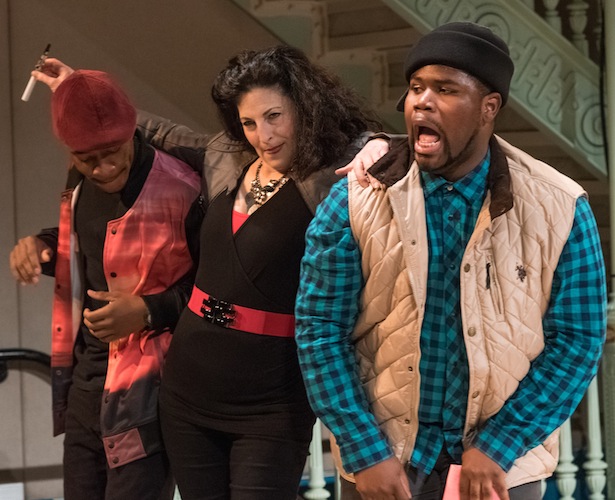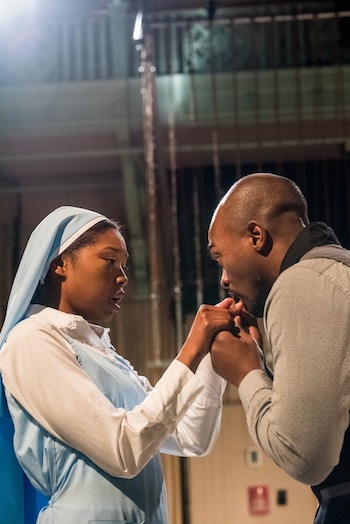Theater Review: “Measure for Measure” – A Problem Play for Shakespeare’s Time — and Ours
Shakespeare may have written Measure for Measure as a dystopian satire of what it would be like if the Puritans were ever to take over England and use the power of the state to harshly enforce their moral code.
Measure for Measure by William Shakespeare. Directed by Megan Sandberg-Zakian. Presented by Actors’ Shakespeare Project, at the Multicultural Arts Center in Cambridge, MA., through February 1.

Duke Vincentio (Michael Forden Walker) and Friar Peter (Jared Michael Brown) in the ASP production of “Measure for Measure.” Photo: Stratton McCrady Photography.
By Ian Thal
Thought it has a catchy title, Measure for Measure, is not among the Bard’s better known plays. It has fallen out of fashion over the centuries, perhaps because of our shifting views of what a comedy is. Though the script has been slotted in the latter category — no one dies and most of the central characters end up married — it is a pretty strange fit. Here is a drama where death and sexual extortion, as well as personal and political corruption, loom large. This doesn’t square with our conceptions of what light entertainment is supposed to be, which has put 1604’s Measure for Measure in the so-called “problem plays” slot. Confusion inevitably means fewer performances and thus the diminished popularity.
Thankfully, Actors’ Shakespeare Project, to its considerable credit, is no slave to fashion; it has always celebrated the weirder entries in the Shakespearean canon alongside the perennial favorites. With this production the peripatetic troupe, after many years, returns to the Cambridge Multicultural Arts Center, whose performance space, which once was the courtroom at the Middlesex Country Courthouse, is an appropriate venue for Shakespeare’s meditation on the ambiguous intersections among law, personal morality, mercy, and justice.
Scenic designer Megan F. Kinneen delivers a rather minimal set. The building’s original architect, Charles Bulfinch, essentially dictates the focus of the space: high Victorian era ceiling, green wrought-iron staircase and catwalk, ornate walls, tall shuttered windows, painted surfaces, and marble floors. (This must be one of the Boston area’s most gorgeous performance spaces.) Kinneen limits her influence to ingeniously creating a jail cell out of a rope and pulley system, a floor design that contains the Roman goddess Justitia (much abused in this story) with her scales and blindfold, and two banners that fuse the red, white, and blue of the Stars and Stripes with black and white images of Cambridge’s Central Square. Perhaps the latter images are a warning that “this could happen here.”
Indeed, as the play begins Lady Justice is litered with papers, opened envelopes, cigarette boxes, pill containers, and empty liquor bottles. Vincentio (Michael Forden Walker), the Duke of Vienna (some scholars theorize the play’s Austrian setting is the result of a latter revision, given that most of the characters have Italianate names) is clearly in the midst of some personal crisis. He informs his personal assistant, Escalus (Thomas Grenon) that he is taking leave of Vienna and is appointing Angelo (Maurice Emmanuel Parent) to rule until he returns, perhaps from detox –a production update because the text implies that he is going off on a diplomatic mission.

Gentleman Client (Jared Michael Brown), Mistress Overdone (Sarah Newhouse), and Lucio (Johnnie McQuarley) in the ASP production of “Measure for Measure.” Photo: Stratton McCrady Photography.
We again see Justice degraded when Lucio (Johnnie McQuarley) and another young gentleman (Jared Michael Brown in one of many roles) pretend to mount her unmoving form as part of their revels as they wait for the arrival of Mistress Overdone (Sarah Newhouse), the proprietor of the local brothel. Clearly, law and justice are on the skids in this dissolute city. The upright-to-the-max Angelo sees his recent elevation as a perfect opportunity to remove this decadence.
As first, Angelo does what one would expect of an moralistic authoritarian who blames his society’s problems on declining moral behavior. He orders that all the laws Vincentio failed to enforce, no matter how archaic, be followed as strictly as possible. Mistress Overdone and her pimp Pompey Bum (Lydia Barnett-Mulligan) are forced to shut down their business in the suburbs (a move that would have offended many Elizabethan theatergoers). One of the public morality dragnets lands a young gentleman, Claudio (Brown again), who is arrested for having impregnated his girlfriend Juliet, (Barnett-Mulligan again). The laws against fornication are severe: Angelo sends the couple to prison and orders Claudio’s execution.
When Claudio’s sister Isabella (Adrianna Mitchell) hears of Claudio’s plight, she leaves the convent where she is a novice and goes to Angelo to plead for mercy. Once Angelo sees her, he discovers that politics is not only a tool for advancing strict morality: it is also a powerful means to satisfy a sexual demand he has never before admitted to himself. Angelo is far from unmoved by Isabella’s demand for her brother’s release; he finds himself driven to possess her. Parent puts in a remarkable performance as the dictator who, at first, is shocked by his rise to power and is then just as surprised by the arrival of his newfound libido. Like many a would-be-rapist, Angelo tries to absolve himself of moral culpability: Isabella is to blame because his beautiful intended victim is just too pure, too virginal to remain unstained. He gives her an ultimatum: If Isabella would give him her virginity, he will not execute her brother. Chastity, Justice, and Mercy — all will be violated.
In an interview, director Sandberg-Zakian says she deliberately cast many of the main characters with African-American actors as a reference to current controversies about police violence against the black community (the killings of Michael Brown in Fergusson and Eric Garner in Staten Island received the most attention). With this didactic intent in mind, costume designer Miranda Kau Giurleo dresses most of the younger characters in hoodies and clothing identified with hip-hop fashions, and sound designer David Reiffel uses an insistent bass commonly heard in dance clubs (though he contrasts these sounds with the moody, minimalistic piano playing of Parent’s Angelo, whose taste hints at his conflict with the city and within himself). In truth, this racial injustice theme doesn’t resonate all that strongly with the text. Thankfully, Sandberg-Zakian and the talented ASP cast members don’t attempt to develop the race and policing angle to that point that it detracts from the play’s real timeliness — its look at political corruption, fundamentalist doctrine, and sexual exploitation.
Shakespeare may have written Measure for Measure as a dystopian satire of what it would be like if the Puritans were ever to take over England and use the power of the state to harshly enforce their moral code. (The Bard’s lampoon would not have been very funny after his death given that the Puritans, empowered by the Protectorate of Oliver Cromwell, shut down the theaters once they had the chance.) The conflict between Angelo’s hyper-ethical public persona and his attempt to use his power over life and death to leverage the deflowering of a nun resonated neatly with the anti-Catholic propaganda of Protestant England, which often focused on the debauchery (whether real or imagined) of the supposedly celibate clergy. The play also explores the spiritual conundrums of dealing with sinful humanity: render harsh judgement or merciful compassion? Contemporary audience members might very well see the descendants of Angelo in outspoken homophobic politicians and preachers who are outed by their rent-boys. Those more attuned to policy than scandal might consider the play to be a warning about the double-dealing of a religious right that seeks to regulate sexual behaviors and reproductive choices. Others might think of the clerical sex-abuse scandal that continues to rock the Catholic Church today or the sizable pornography stash found on computers recovered from the Osama Bin-Laden Compound.

Isabella (Adrianna Mitchell) and Angelo (Maurice Emmanuel Parent) in the ASP’s production of “Measure for Measure.” Photo: Stratton McCrady Photography.
The value of Isabella’s virginity is another unresolved issue in Measure for Measure. Is her untainted condition to be admired (as was the virginity of the much adored and recently deceased Queen Elizabeth) or ridiculed? This ambivalence manifests itself when the secular-minded Claudio argues that Isabella ought take Angelo up on his offer. Not only will it save his life, but, because existence is only a matter of pleasure, why should sexuality be repressed for the sake of a supposed afterlife where virtue is rewarded? The returning Duke Vincentio (while disguised as a Friar, no less), aids Isabella by removing Angelo and freeing Claudio. Yet he turns around and demands that she give up her religious vows and marry him. Not your conventional happy ending. Female virginity, then as now, is fetishized by both moralist and would-be conquerer with equal intensity.
Adrianna Mitchell makes for a forceful and impassioned Isabella, dismissing with aplomb the unacceptable choices posed by the tyrannical Angelo and her hedonistic brother. She is also stirring when arguing on behalf of mercy (in language that echoes Portia’s in The Merchant of Venice, though without the realpolitik baggage of that speech.) Maurice Emmanuel Parent very subtly makes us see Angelo as a villain whose despotism springs from his pathetic ill-suitedness for both his duties and his desires. He is uncomfortable with lust — for either authority or sex. Michael Forden Walker puts in a great performance as the dissolute Duke who realizes that before he can eradicate the diseases afflicting his city he must first cure his own ills; yet he comes to realize that, even after he has brought firm yet compassionate justice to bear, he is still driven by appetites that he simply cannot hold in check.
Jared Michael Brown displays an amazing range. He is an engaging Claudio, expressing his contempt for his sister’s religion and making the case for a hedonistic atheism while he pleads for his life. His holy roller (and co-conspiritor with the Duke) Friar Peter is effective ,and he provides nimble clowning as Elbow, the constable who is Pompey Bum’s nemesis. Lydia Barnett-Mulligan provides agile antics as well, both as the bawdy Pompey and as the morbid executionor Abhorson (one of the Bard’s many delightfully obscene double-entendrés). Johnnie McQuarley also makes a strong impression as both Froth, a nebbishy brothel customer, and as the anachronistically Jamaican Patois-speaking prisoner Barnardine. Sarah Newhouse gyrates obscenely as a Mistress Overdone who knows just what her clientele wants to see, and she quickly becomes a vulgar capitalist once the law gets in the way of her making a dishonest living. Meanwhile, Newhouse’s Provost understands that justice is sometimes best served by bending the law, though not before she first ensures that she has plausible deniability if the injustice hits the fan.
Measure for Measure remains unsettling because it attempts to reconcile a happy ending with its disturbing portrayal of political power, religious dogma, and sexual exploitation. but it is this unsettling nature that ensures this problem play of Shakespeare’s time is a problem play for our time and all time.
Ian Thal is a playwright, performer and theater educator specializing in mime, commedia dell’arte, and puppetry, and has been known to act on Boston area stages from time to time, sometimes with Teatro delle Maschere. Two of his short plays appeared in theater festivals this past summer. He has performed his one-man show, Arlecchino Am Ravenous, in numerous venues in Massachusetts and Rhode Island. One of his as-of-yet unproduced full-length plays was picketed by a Hamas supporter during a staged reading. He is looking for a home for his latest play, The Conversos of Venice, which is a thematic deconstruction of Shakespeare’s The Merchant of Venice. Formerly the community editor at The Jewish Advocate, he blogs irregularly at the unimaginatively entitled From The Journals of Ian Thal, and writes the “Nothing But Trouble” column for The Clyde Fitch Report.

Interesting to think of Shakespeare’s Measure for Measure as a foreshadowing of Margaret Atwood’s The Handmaiden’s Tale.
I was thinking that myself right after I emailed you the first draft, but as you can attest — it was long enough already!